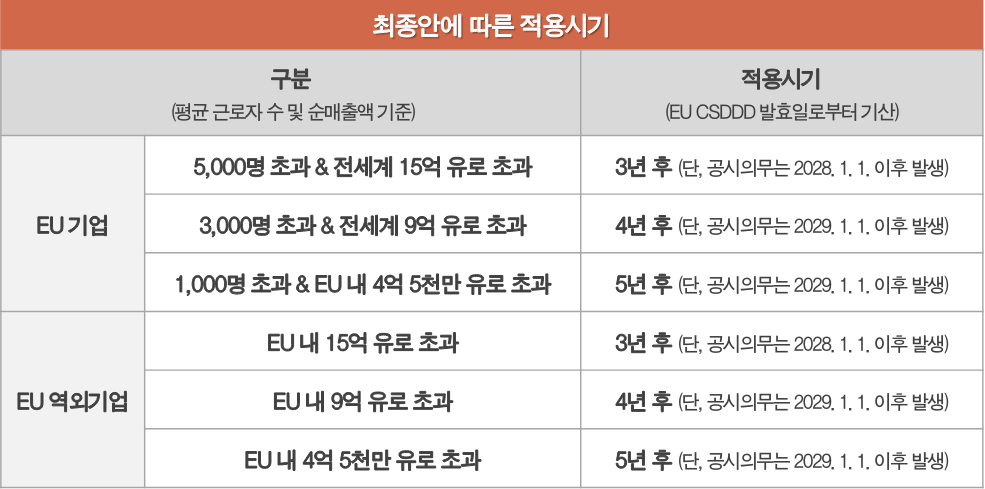EU 핵심원자재법이 역외기업 차별조항 등은 포함하고 있지 않아 우리나라 기업에 미치는 영향은 제한적일 것으로 예상되고, 공급망실사지침은 대상범위가 대폭 축소되었으나 오는 4월까지 EU 의회 내 입법동향을 예의주시해야 할 것으로 보인다.
.jpg) EU 핵심원자재법, 역외기업 차별조항 미포함…韓 기업 영향 제한적
EU 핵심원자재법, 역외기업 차별조항 미포함…韓 기업 영향 제한적
공급망실사지침, 대상범위 대폭 축소…4월 EU 의회서 승인 전망
EU 핵심원자재법이 역외기업 차별조항 등은 포함하고 있지 않아 우리나라 기업에 미치는 영향은 제한적일 것으로 예상되고, 공급망실사지침은 대상범위가 대폭 축소되었으나 오는 4월까지 EU 의회 내 입법동향을 예의주시해야 할 것으로 보인다.
심진수 산업통상자원부(이하 산업부) 신통상전략지원관은 26일 공급망 및 기후에너지 통상 관련 유관기관 회의를 개최하고, 최근 유럽연합(EU)의 관련 입법 동향과 우리 기업에 미치는 영향 등을 점검했다.
유럽연합이 그간 추진해 온 핵심원자재법과 공급망실사지침은 최종 승인 및 발효를 앞두고 있으며, 탄소중립산업법은 2024년 2월 3자(집행위원회-이사회-의회)간 합의를 마쳤다.
원자재의 안정적인 공급 확보를 목표로 하는 핵심원자재법은 전략원자재의 역내 생산역량 강화(역내 추출 10%, 가공 40%, 재활용 25% 이상) 및 수입의존도(65% 미만) 감축 목표를 설정하고, 전략 프로젝트 지원과 리스크 완화 조치 등을 규정하고 있다.
역외기업 차별조항 등은 포함하고 있지 않아 우리 기업에 미치는 영향은 제한적일 것으로 보인다.
일정규모(직원 1,000명, 전 세계 순매출 4.5억유로 이상 역내기업 등) 이상의 역내외 기업에 공급망 내 인권·환경 의무를 골자로 하는 공급망실사지침은 대상범위가 대폭 축소되어 초안 대비 부담이 완화되었다고 평가된다.
한편, 탄소중립기술 제조역량 향상을 목적으로 하는 탄소중립산업법의 3자 합의안은 원자력, 태양광, 풍력 등 대상기술에 대한 허가절차 간소화 등 관련 지원을 규정하며, 역외기업 차별요소는 없는 것으로 파악된다.
정부는 그간 산학연 전문가들과 간담회·대책회의 등을 통해 긴밀히 소통하며, 유럽연합의 입법동향을 공유하고 영향을 점검하는 한편 양국 고위급 회담 등 여러 계기에 우리 업계의 우려와 요청을 유럽연합 측에 전달하는 등불확실성 해소를 위해 노력해왔다.
심진수 신통상전략지원관은 “유럽연합의 입법 및 시행에 따른 기업부담 및 기회요인을 예의 주시하며 업계·연구기관 등과 긴밀히 소통, 기업설명회 등을 추진하겠다”고 밝혔다.
한편 EU 집행위원회가 2022년 2월 최초 발의한 ‘EU Corporate Sustainability Due Diligence Directive(EU 공급망실사지침, 이하, EU CSDDD)’는 지난 두 해 동안 이사회와 의회 수정안을 거쳤고, 의회와 이사회가 지난해 12월 잠정 합의에 도달함에 따라 순조롭게 통과될 것으로 전망되었다.
하지만 2024년 2월경 당초 형식적인 절차로 생각되었던 EU 27개국 대사급 상주대표회의에서 최초 부결됨에 따라 위 법안의 존폐론이 대두되었고, 이는 독일의 자유민주당(FDP)이 주축이 되어 기업 활동 위축 우려를 이유로 투표에서 기권을 하였고, 이탈리아, 프랑스 등이 가세했기 때문이라고 전했다.
치열한 협상 끝에 ‘EU CSDDD(이하 최종안)’는 적용대상 기업 등이 대폭 완화되는 조건으로 지난 15일 상주대표회의에서 극적으로 가결되었다.
Lee&Ko는 뉴스레터를 통해 현 EU 의회의 회기는 다가오는 EU 의회 선거일로부터 2달 전인 4월경 종료될 예정인 바, 최종안은 법무위원회 검토를 거쳐 올해 4월 EU 의회에서 승인될 것으로 예상된다고 분석했다.

▲EU 공급망실사지침 최종안에 따른 적용 시기(그림 출처: Lee&Ko 뉴스레터)
Lee&Ko는 이어 “최종안에 따른 적용대상 기업과 적용시기가 당초 집행위원회안보다 대폭 완화되었을지라도, 적용대상 기업의 공급망(활동사슬) 내에 있는 기업이라면 실사 대상기업으로서 실사 요청에 응할 계약상 의무를 부담하게 된다는 점에 유의하여야 한다”며 “EU 향(向) 거래를 하는 적용대상 기업과 실사대상기업 모두 오는 4월까지 EU 의회 내 입법동향을 예의주시하는 한편 전세계적으로 의무화되고 있는 추세인 공급망 실사에 대비하여야 한다”고 강조했다.
.jpg)
